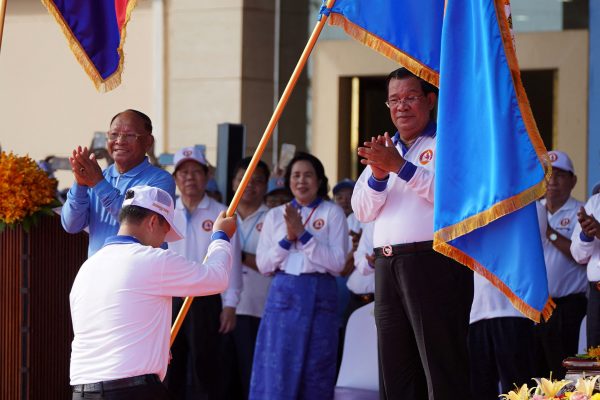The special case of Brunei’s absolute monarch aside, Hun Sen represents the last Southeast Asian incarnation of a type of long-ruling strongman once common in the region, but now mostly found only in Central Asia and Sub-Saharan Africa.
It goes without saying that this longevity can’t be credited to Hun Sen’s knack for retail politics. After he consolidated his rule in the 1990s, Cambodia settled into a form of so-called ‘competitive authoritarianism’ dominated by his Cambodian People’s Party (CPP). After a close call in the disputed 2013 elections, Hun Sen’s tolerance of opposition parties and independent civil society waned. With the opposition having been demobilised and the independent media taken off air, a walkover victory for the CPP in the general elections scheduled for 23 July is a foregone conclusion.
The irony is that Hun Sen snuffed out the competitive elements of his system just when he could have begun to claim the kind of performance legitimacy that propped up the region’s developmentalist strongmen of years past. After bumping along the bottom of the regional economic league tables throughout the 1990s and 2000s, Cambodia graduated to middle-income status in 2015 and is well-placed to formally exit the ranks of Least Developed Countries over the next few years. By the World Bank’s reckoning, poverty rates almost halved between 2009 and 2019.
As David Hutt argues in this week’s lead article, even taking account of all the corruption and injustice that still marks Hun Sen’s leadership, ‘Cambodia has irrevocably changed for the better during his tenure’. Hutt looks beyond the 2023 elections to analyse how the ground is being prepared for Hun Sen to hand over to his chosen successor, his son Hun Manet.
Hun Manet, a 45-year-old army officer, has work ahead of him to put a personal stamp on the regime he’ll inherit. He ‘is a privileged princeling who was expensively educated in the West and then parachuted into the military and the ruling party’, and ‘will take over a country that is already peaceful and economically stable’.
Having come of age politically after Cambodia’s transition in the 1990s and been exposed to life in the West, many Cambodians as well as Western stakeholders would hope that he steers Cambodia towards moderating his father’s autocracy while rebalancing its strategic positioning away from China. As Hutt says, while Hun Sen has a deeply parochial political outlook, ‘Hun Manet — who speaks English — should be a more natural presence on the world stage’. But not much concrete can be inferred from his relative worldliness about where he’d take Cambodia’s foreign policy.
Many commentators see Hun Sen’s Cambodia as a vision of a grim future in which China’s growing economic power is weaponised to prop up rogue regimes and bind them politically to Beijing, undermining both their democracy and strategic autonomy. The reality is more complex: the root causes of Cambodia’s recent political degeneration are overwhelmingly domestic, just as they are in other parts of Asia where democracy is under pressure. Beijing’s stepping in as a backstop to authoritarian governments shunned by the West is better read as an opportunistic play to protect its influence, rather than part of a coherent effort to spread authoritarian rule abroad.
Moreover, no country wants to be overdependent on any patron if it can avoid it: hence Hun Sen’s recent efforts to reach out to the West. Cambodia’s access to the EU’s Generalised Scheme of Preferences scheme that helps exporters in poorer countries is still curtailed, Washington hasn’t renewed Cambodia’s participation in an analogous US scheme and Cambodia wasn’t invited into IPEF negotiations. If Hun Sen or Hun Manet does want to hedge against overreliance on China, the EU and the United States would be wise not to put too many strings on the renewal of trade preferences and aid.
Shoring up the Western role as a central partner in Cambodia’s economic development — even as Cambodia’s integration into the regional and Chinese economy is accelerated by RCEP — could serve the interests of Cambodian democracy over the long term.
As highlighted in a recent book by political scientists Dan Slater and Joseph Wong, the successes of economic development and state-building under authoritarianism in East Asia gave ruling parties the confidence to concede reforms in the knowledge that democracy wouldn’t spell their political obsolescence. Insofar as an openness to cooperation with Cambodia on economic issues helps build the socioeconomic foundations for future democratisation, realpolitik and righteousness can go hand in hand.
The EAF Editorial Board is located in the Crawford School of Public Policy, College of Asia and the Pacific, The Australian National University.

